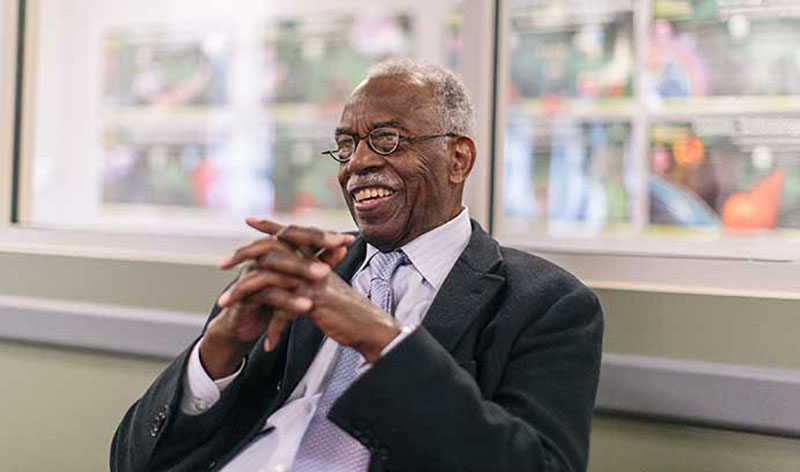Date: Wednesday, October 5, 2022
Time: 9:30-10:30AM
Location: Rauch Business Center, Room 241
This event features Rodney D. Priestley, as the Costel Denson Distinguished Lecturer, who will talk about “Glass Transition and Dynamics of Nanoscopically Confined Polymer”, as part of the Lehigh University Chemical and Biomolecular Engineering's Fall 2022 Colloquium Seminar Series.
Dr. Costel ’Cos” Denson (1934-2018)
He was the first African-American student to graduate from Lehigh. He earned his B.S. degree in chemical engineering from the university in 1956 and his master’s degree in chemical engineering from Rensselaer Polytechnic Institute in 1960. He earned his Ph.D. in chemical en-gineering from the University of Utah in 1965. After a long and successful career at General Electric, Denson joined the faculty at the University of Delaware, serving as professor of chemical engineering, interim dean of engineering, and vice provost for research. He also was a visiting professor at the University of California at Berkeley, the University of Naples, and Lehigh University. Denson served on numerous environmental advisory boards including the U.S. Department of Defense: Scientific Advisory Board, and the U.S. Environmental Protection Agen-cy. He served as a member of many professional societies, including the American Institute of Chemical Engineers and the Society of Rheology. He served on the executive committee of the Society of Plastics Engineers and was a member of a National Science Foundation panel judging proposals in the area of math, sciences and technology education. He widely published and held two patents.
Dr. Denson launched two companies based on technology he developed. He served as the managing member of Costech Technologies, LLC, and a company that advised on environmental research programs. His many honors include Honorary Doctoral Degree in 2015 from Lehigh University, the Thomas H. Chil-ton Award of the Wilmington section of the American Institute of Chemical Engineers and the Interna-tional Award for Research of the Society of plastics Engineers. In 2017 Lehigh University created in his honor “The Dr. Costel Denson ‘56 Alumni Award” to be awarded annually to a Lehigh alumnus who has demonstrated leadership by proactively seeking to identify and implement pathways to increase diversi-ty in the American workplace and in our educational institutions.
Abstract
Many technological advances are driven by the ongoing emergence of nanostructured polymers as the critical component to enable innovation. Yet, from a materials design perspective, we cannot presume that the bulk properties of polymers define their behavior when physically confined to nanoscale dimensions. This is, in fact, not true, as there is now convincing evidence that the nanoscale properties of polymers, including the glass transition temperature, can be profoundly different from the bulk. In this presentation, I want to highlight two recent examples from my group that aimed to advance the field of understanding polymers in confinement and at interfaces. In the first part of the talk, we introduce a time-resolved nano-creep experiment to probe the dynamics at the surface of polymer glasses. We reveal a new mode of molecular dynamic at the surface: pseudoentanglements. This phenomenon causes unentangled chains to exhibit surface mechanical response and dynamics that are characteristic of entangled polymers. For entangled chains, the phenomenon prolongs and stiffens the entangled response. In both cases, the breadth of the entangled response grows on cooling, leading to a breakdown of time-temperature-superposition at the surface. Counterintuitively, this new mode of slow surface dynamics emerges precisely because surface dynamics are accelerated relative to the bulk. In the second part of the talk, we present an experimental methodology to allow for the first direct measurement of the local glass transition temperature (Tg) in block copolymers. This is achieved by incorporating fluorescence-bearing monomers at specific locations along the polymer chain, allowing the labeled monomers local environment to be interrogated via fluorescence. As an example, in lamellar forming poly(butyl methacrylate-b -methyl methacrylate) diblock copolymers, a strong gradient in glass transition temperature, Tg , of the higher-Tg block, 42 K over 4 nm, was mapped with nanometer resolution. These measurements also revealed a strongly asymmetric influence of the domain interface on Tg , with a much smaller dynamic gradient being observed for the lower-Tg block. We also find that chain connectivity plays an important role in setting the glassy dynamics in diblock copolymers.
About the Speaker
Rodney D. Priestley is the Dean of the Graduate School at Princeton University. He is the Pomeroy Betty Perry Smith Professor in the Department of Chemical and Biological Engineering and the Associate Director of the Princeton Center for Complex Materials. He obtained his Ph.D. in Chemical Engineering from Northwestern University in 2008. His research involves describing and developing complex materials, especially nanoparticles, thin polymer films, and nanocomposites, focusing on material properties at small length scales. From designing next-generation biocompatible surfactants to creating ultra-stable polymer films resistant to properties changes upon heating, his work impacts industries ranging from personal care to aerospace. His recent interests include the use of polymers in sustainability and their implications on the environment. Recent recognitions include the 2020 American Physical Society Dillon Medal and 2020 American Chemical Society Macro Letters-Biomacromolecules-Macromolecules Young Investigator Award.


